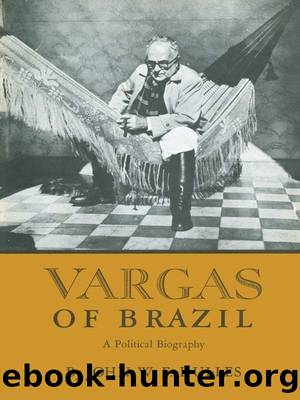Vargas of Brazil: A Political Biography by John W. F. Dulles

Author:John W. F. Dulles [Dulles, John W. F.]
Language: eng
Format: epub
Tags: -
Publisher: University of Texas Press
Published: 2014-07-03T03:00:00+00:00
Getúlio was highly provoked by the treatment which the foreign press gave to âhis sincere words and patriotic foresight.â Addressing a group of maritime workers on June 29, he assailed those who had interpreted his recent speech âwith false commentary and tendentious publication of isolated phrases.â10 A bit later, after someone sent Dutra a collection of United States press clippings attacking the Brazilian dictator and Armed Forces, Getúlio observed that in Brazil he prohibited the press from criticizing Roosevelt or the United States. Aranha tried to explain United States press freedom, but incensed Brazilian generals discussed suing the offending United States newspapers.11
Washington was worried about the Latin American reaction to German successes in Europe. With the Uruguayans âclimbing on the Nazi band wagon,â12 United States observers were convinced that there was danger also in Brazil. Late in May, Ambassador Caffery described the public and the Government, including Aranha, as getting panicky.13 Although Caffery felt that most thoughtful Brazilians favored the Allies, he considered the pro-Axis elements better organized.
Hans von Cossel had the title of German Embassy counselor and press attaché. But his prestige among Germans exceeded that of their ambassador, for Cossel was the personal representative of Adolf Hitler. At his well-financed headquarters in São Paulo he directed a staff of over a hundred in disseminating anti-United States propaganda in pro-German newspapers, over the radio, and in pamphlets.14
The Germans were well entrenched in commercial aviation and were felt to have done an excellent job in this field. Condor, handsomely subsidized by its parent, Deutsche Lufthansa, had over twenty-five German aircraft piloted by Germans. Its routes, many of them of dubious commercial value, covered the strategic Northeast. Brazilian airlines (VASP and VARIG) used German equipment and Condorâs shops, and had working agreements with Lufthansa.
The only direct air service between South America and Europe was carried out by LATI, the Italian airline. Its usefulness was defended by Aranha, but it was also very useful to Germans. Called by a British spy âthe biggest gap in the British economic blockade,â it carried German and Italian diplomatic pouches, propaganda, mica, diamonds, platinum, and chemicals; also Axis officials and agents.15 As was suspected at the time, LATI passed shipping information on to Nazi raiders and submarines, and both LATI and Condor helped Axis merchantmen run the British blockade.16
In October 1940, Vargas decreed that all pilots of aircraft of Brazilian registry should be native-born Brazilians, but in special cases temporary exceptions to this ruling were granted. Washington sought to have Panair do Brasil, then wholly owned by Pan American Airways, expand in Brazil. After VASP suffered a plane crash Washington offered to sell it planes in return for its de-Germanization.
Rio authorities discounted Allied press reports of âalmost unbelievable Nazi penetrationâ and âFifth Column perilâ in Brazil. As Rio Police Chief Filinto Müller saw his job, it was to round up people suspected of wanting to overthrow the Estado Nôvo. These turned out to be Communists; not the Nazi spies who radioed information about ship departures to German submarines.
Download
This site does not store any files on its server. We only index and link to content provided by other sites. Please contact the content providers to delete copyright contents if any and email us, we'll remove relevant links or contents immediately.
| Military | Political |
| Presidents & Heads of State | Religious |
| Rich & Famous | Royalty |
| Social Activists |
Waking Up in Heaven: A True Story of Brokenness, Heaven, and Life Again by McVea Crystal & Tresniowski Alex(37811)
Empire of the Sikhs by Patwant Singh(23086)
We're Going to Need More Wine by Gabrielle Union(19046)
Hans Sturm: A Soldier's Odyssey on the Eastern Front by Gordon Williamson(18591)
Leonardo da Vinci by Walter Isaacson(13336)
The Radium Girls by Kate Moore(12028)
Tools of Titans by Timothy Ferriss(8396)
Educated by Tara Westover(8054)
How to Be a Bawse: A Guide to Conquering Life by Lilly Singh(7486)
Permanent Record by Edward Snowden(5847)
The Last Black Unicorn by Tiffany Haddish(5635)
The Rise and Fall of Senator Joe McCarthy by James Cross Giblin(5280)
Promise Me, Dad by Joe Biden(5153)
The Wind in My Hair by Masih Alinejad(5095)
A Higher Loyalty: Truth, Lies, and Leadership by James Comey(4964)
The Crown by Robert Lacey(4817)
The Iron Duke by The Iron Duke(4356)
Joan of Arc by Mary Gordon(4110)
Stalin by Stephen Kotkin(3965)
